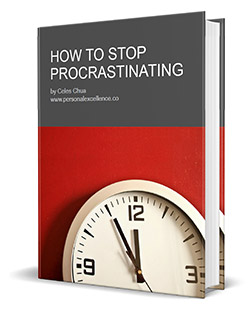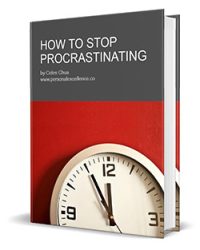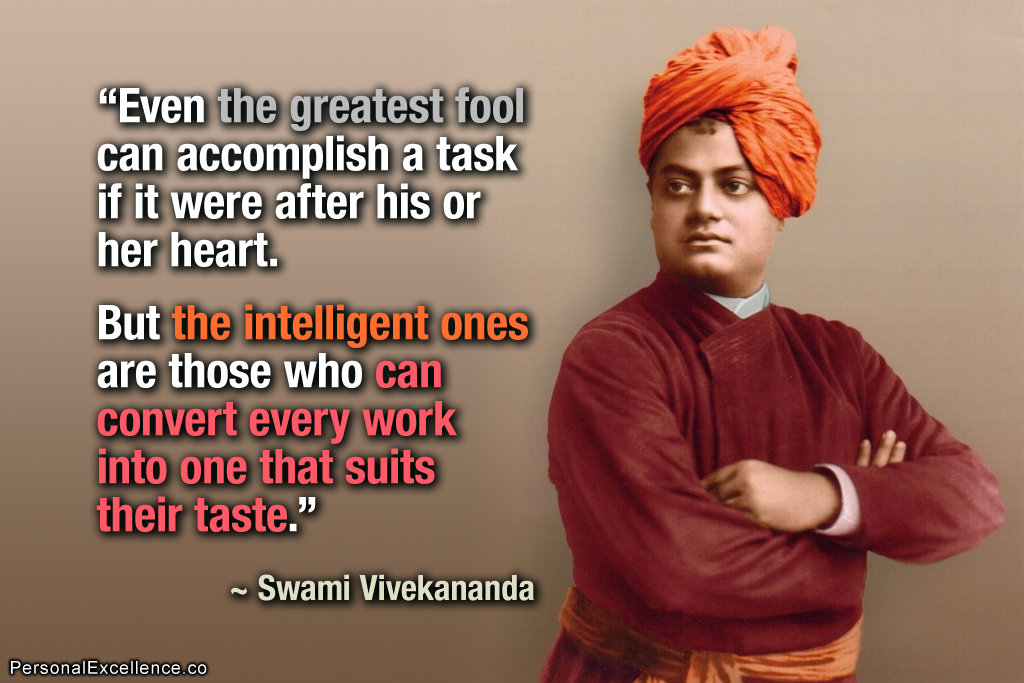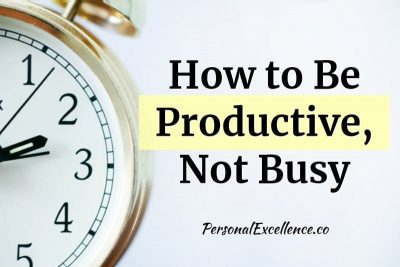
This is the last part of a 5-part series on procrastination and how to tackle it at the root.
- Part 1: Why Stop Procrastination?
- Part 2: Procrastination – Symptom of An Issue
- Part 3: 1st Root Cause of Procrastination: Lack of Desire
- Part 4: 1st Root Cause of Procrastination: Fear
- Part 5: How To Stop Procrastination: Complete Guide
If you have read this far, I assume procrastination is a problem you face and want to address. In the Anti-Procrastination Course, I share my complete set of framework and tools to overcome procrastination for life. In this post, I share a simplified 6-step exercise to get you started on tackling procrastination.
Exercise To Uncover Why You Procrastinate
Grab a pen and paper or open your word processor. Set aside 20 minutes or so for this. We will be doing a fair bit of writing for this exercise.
Think of your mind as containing thousands of layers of information. Below these layers lies your subconsciousness. Every day, more layers get piled on as you face new situations. In order to get down to your subconsciousness, we need to clear off these layers (done through steps 2-4) and get down to the depths of your mind.
Ready? Here we go. :)
1) Identify something you are procrastinating on, even though you want to work on it
This should be an area where you have displayed a continuous pattern of procrastination. For illustration purposes, I’ll use the example of exercising to keep fit.
2) Ask yourself: “Why am I putting this off?”
Write down everything that comes up. You may have 1 answer, 2 answers, or even 5 answers – it doesn’t matter. Even if your mind responds with “I don’t know,” write that anyway, then ask the same question again. Chances are, you’re going to get a different answer each time. Just keep on writing until nothing else comes up. This process may take anywhere from 5 minutes to even over 30 minutes if there’s a lot of stuff to write. Everything you write in step 2 are your first level answers.
Possible first level answers for procrastinating on exercise are
- I don’t want to exercise
- I’m too lazy
- I have no discipline
- Exercising is boring
- The gym is too far away
- I don’t know
- I hate exercising
- I don’t have enough time
3) Pick out hotspot answers for probing
If you remember in part 2 of the series, I shared that laziness and lack of discipline are rarely the real issues. Approaches involving discipline and time management are like ointments and creams for mosquito bites. They patch up the symptoms without dealing with the root of the problem. Thus, ignore answers like “I’m too lazy,” “I have no discipline,” and “I don’t have enough time.” Probing in those areas will usually get you nowhere.
Referring to the other answers, pick out the hot spots answers for probing. Hot spot answers refer to any answer that is more than meets the eye. When probed, they reveal other layers underneath. Hot spot answers are usually tied to:
- Your feelings (such as desire, fear, and feelings of discomfort) . Examples are “I don’t feel like doing it,” “I’m scared,” “I feel tired,” or “I hate doing this,”
- Your ability. Examples are “I don’t know how,” “It takes so much time,” or “There’s so much to do.”
In the exercising example above, some hot spot answers are “I don’t want to exercise” and “I hate exercising.”
4) Probe into the hotspot answers from Step #3
Dig into the answers to uncover what lies underneath. One of the ways I share with my course participants is to question why this is the case or why this matters. Some examples to dig into hotspot answers:
- “I don’t want to [exercise]” → Ask yourself: “Why don’t I want to exercise?”
- “I hate [exercising]” → Ask yourself: “Why do I hate exercising?”
- “I don’t know how to do this” → Ask yourself: “So what if I don’t know how to do this?”, “What does it mean if I don’t know how to do this?”, “Why is this stopping me from doing the task?”
5) Repeat Step #4 until you reach an “aha” moment that cracks the issue wide open
Keep probing until you get an “aha” moment. My course participants often ask is, “How do I know if I’ve reached an aha moment?”
The short answer is this – you’ll know when it comes. You will feel a surge of resonance when you arrive at the answer, because everything suddenly clicks and makes sense. You finally realize why you’ve been avoiding this activity the whole time — not because of laziness, but because of something else.
For example, here are some revelations my past participants received:
- Someone who procrastinates losing weight (to be more attractive) → Because he/she hates himself/herself and wants to be unattractive so no one will like him/her
- Someone who procrastinates getting close to his/her parents → Because he/she is afraid of being alone when they pass away one day
- Someone who procrastinates finding a partner → Because he/she has low self-worth and is afraid of putting himself/herself out there
- Someone who procrastinates rehearsing for a performance → Because he/she is afraid that he/she is incapable and can use the excuse of lack of preparation if his/her performance is not the best
- Someone who procrastinates going to work → Because he/she has lost the passion for the job
The more connected you are with your higher self, the easier the exercise. If you often take time to reflect, this exercise will be relatively easy. Chances are, the answers will affirm what you already know about yourself.
On the other hand, if you frequently repress your thoughts/feelings and have low self-awareness, this exercise may take longer. You may find yourself blocked, where the same answers keep surfacing. This may also happen for self-aware people when they try to dig into a blind spot of their lives — this is where having a coach is really useful to help you uncover your blocks. Some of my course participants experience this when we dig into a deep-set pattern in their life, where the only answer that comes up is “I don’t know” or “I’m not sure.”
When that happens, don’t give up. Just because you don’t reach an “aha” the first time round doesn’t mean you’re not going to get the answer! Every time you communicate with your subconsciousness, you build a stronger connection with it. As long as you press on, the answer will eventually surface. Other things you can try are:
- Ask the questions in different sittings. You don’t need to do the exercise at one go. You can do it in different sittings.
- Use different angles. If you reach a dead end, backtrack to the previous answer. Then, ask a different question or ask the same question in a different way. A question like “Why am I not doing this task?” can be phrased as “What is making me avoid this task?” or “What is it about this task that’s making me avoid it?” or “Why am I not working on this?”
While some of the underlying beliefs for procrastination may seem crazy (e.g. procrastinating on losing weight because you want to repel people), they are very real reasons for procrastination. My clients and course participants are often shocked when we do the digging exercise together and they uncover all the hidden, nasty beliefs formed from young. These are usually misconceived beliefs formed due to negative experiences or incidents when young, what I call childhood stories. As we are less self-aware at a young age, we form many beliefs based on what we observe, without knowing what is right or wrong. Over the years, these beliefs get embedded into our subconsciousness and guide our external actions — such as procrastinating on X even though we consciously want to do X.
6. Create an action plan to solve the root issue
Having uncovered the root, create your action plan to address that.
Realization of the root issue is often enough to trigger one into action. That’s because it becomes obvious that procrastination is the wrong solution to move forward. For example, if you have lost passion for your job, your immediate move should be to identify work you’re passionate about and pursue that. Procrastinating in your current job only prolongs the issue — it’s not going to help you in any way. Another example is procrastinating on finding your life partner because of low confidence. The logical step forward should be to work on your confidence, not to avoid relationships your whole life.
Once I had a client who was procrastinating on losing weight. After diving into the root cause, we found out that her procrastination was because of a lack of self-love. Deep down, she didn’t want to lose her excess weight because she didn’t want to get unwanted attention from men. Another reason was because she didn’t want to be beautiful (by her definition), because she didn’t associate herself with beauty. Since young, she had thought of herself as an “ugly duckling.” This was due to a lack of self-love — she didn’t see herself as beautiful.
The solution here is to work on self-love while working on weight loss, rather than losing weight to love herself (do you see the difference?). Tackling the root cause, because this is what’s stopping you from achieving your goal. Here, an action plan to improve self-love can include saying positive affirmations, addressing negative body image, removing critical relationships, and working on your personal goals.
This is the last part of a 5-part series on procrastination and how to tackle it at the root.








 I hope you find my content helpful. Join my community of 65,000 readers and get my latest articles delivered to your inbox. Your email is safe and I never send spam.
I hope you find my content helpful. Join my community of 65,000 readers and get my latest articles delivered to your inbox. Your email is safe and I never send spam.
Hi Celes! I just accidentally came across your website the other night as I was searching for some articles. I’ve read plenty of your articles already and I thought they were awesome :D Gotta love the life handbook concept, been keeping a notebook and notes in Evernote, Google Keep, etc. related to its concept but never thought about compiling them before.
Anyways, I have to ask though, how does one overcome such psychological roots? How does one even start implementing the ESPER with it when it’s something that cannot be easily given a solution?
For example, here in this article one’s procrastination may be a psychological one. For me, I believe it’s to do with my low self-esteem or self-worth. I really related to what you stated about avoiding things (for me it’s my studies/requirements/college stuff) even though one would really want to do them or is highly interested in doing those things, but fear overcomes desire. Hating the feeling of not being good enough when overwhelmed, or when out of control.
I had the same thought when I read your losing weight/improving self-image article, about not losing weight because you secretly wanted to be fat, and that you secretly hate yourself. I think it really applies to me as well :))) How in the world does one start to confront hating oneself?
I’ve read your article about self-worth, and I think I’ve attached my sense of self-worth to my competencies/skills/expertise and my weight. I’m not as much of a genius as some of my classmates are, but I do want to be better. I see now that I’ve placed a filter on myself due to peer influence that I could only do up to this certain level and that I can’t do any better, and that other people are just better. I’m still in progress with improving my skills and my life with my studies, as it’s an area I really wanted anyway and wanted to excel in. Though I guess part of why I was so depressed back then was because I wanted to help the environment, and I couldn’t see how my degree would help me with this desire (I was with the idea that technology is actually destroying our environment, and I’m in engineering). I’m not overweight, but I’m leaning more on the chubby side and want to lose weight to be fit and healthy. And to be more productive.
But now I think I’m at a loop. I’m procrastinating on what I attached my sense of self-worth to (or what I feel is weighing so heavily on my shoulders such that I have low self-esteem). But to address my procrastination I have to address my self-esteem.
And I have no idea how to fix or approach this at all :)) I’ve also read on your self-worth article that one has to not attach such things to one’s self-worth since it’s temporary. But what can I do if it means so much to me? Am I just to attach it to the thought that I’m striving to be better at those things, to level up, and that’s ok? But here we are with the loop again. I guess I also fear being lousy. I have a deep of fear of not being good enough. So what does one even do with a fear of not being good enough? :))
I’m afraid I also didn’t understand what you meant about attaching one’s self-worth to something else. Something permanent. So am I supposed to just attach it to my being a good person? That I haven’t killed anyone yet or something? But good intentions are nothing without action.
I guess this also has something to do with the level of how I believe in myself. I’m working on that. Though it is related to my self-esteem.
If ever you read this and reply to help, I’ll love you forever :))) lol. This is really a deep and concerning problem for me at the moment. I have 2 years of college life remaining and I want to make the most out of it. And I also have half a semester remaining for now, and I’m afraid I’ve not done as well as I could for the first half despite me wanting to do so :( I think it’s because of my fear, which leads to procrastination, and because I secretly hate myself for all for all of this.
Anyways, even if you don’t reply or don’t see this I want to thank you for your articles on this site :D
I tend to procrastinate about getting a job, exercising, getting involved in organizations. I know why. My aha moment came recently. Not sure exactly how, but it happened. All that was bottled up, all of my past just exploded in my head. I love my life. I love that I am able to explore my art. I love that I have an amazing man by my side while I try to get better. I am grateful for some amazing doctors that are doing their best to help me. I am grateful to be surrounded with those that love me as much as I love them.
HI Celes,
I find value in the steps, but I think the most value lies in the statement: “The more connected you are with your higher self, the more effective this exercise.” If someone feels badly about themselves…as in self esteem on the floor badly, it’s going to be really hard to get to an answer that doesn’t involve a whole lot of negativity. And the incentive to move past it when you don’t feel very good about yourself is lower when you don’t feel like you deserve something better. Nonetheless…great food for thought.
Larry
Commenting for this post is closed.